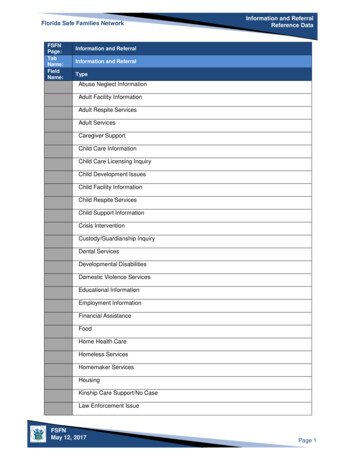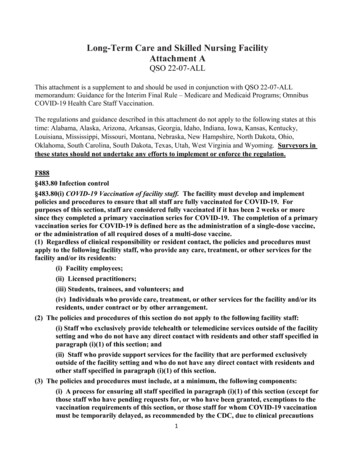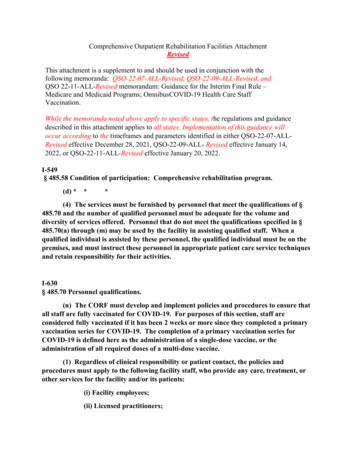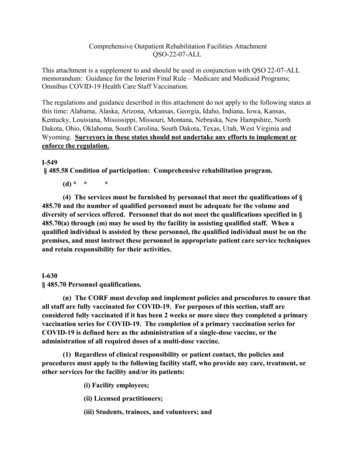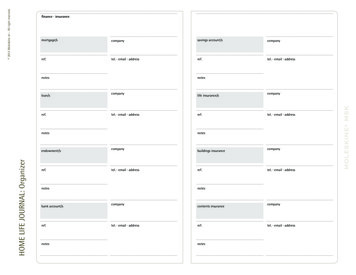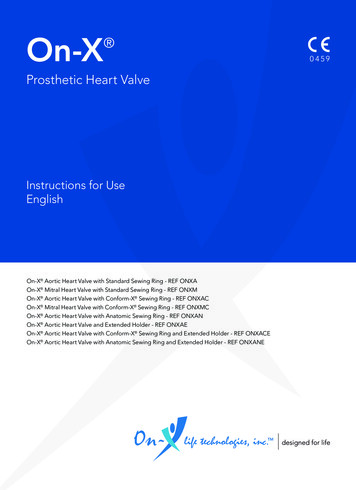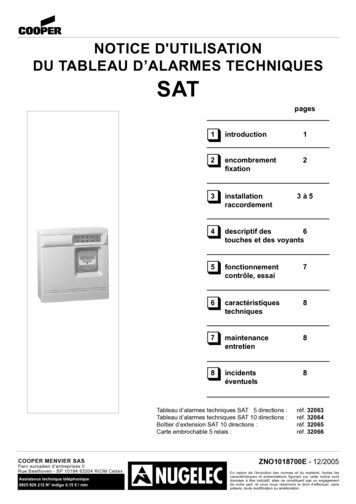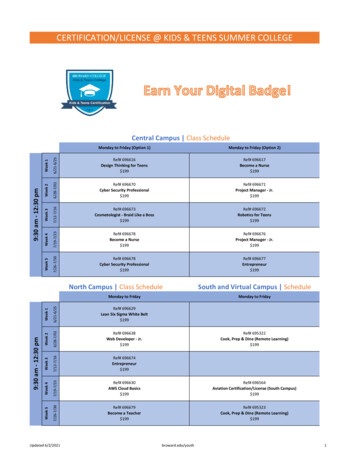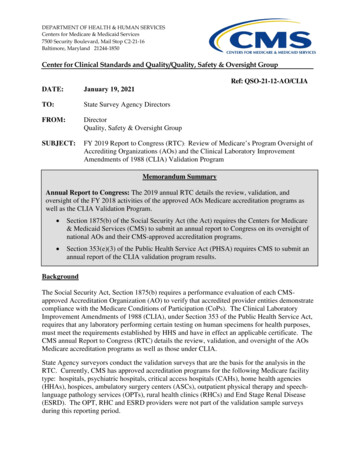
Transcription
DEPARTMENT OF HEALTH & HUMAN SERVICESCenters for Medicare & Medicaid Services7500 Security Boulevard, Mail Stop C2-21-16Baltimore, Maryland 21244-1850Center for Clinical Standards and Quality/Quality, Safety & Oversight GroupRef: QSO-21-12-AO/CLIADATE:January 19, 2021TO:State Survey Agency DirectorsFROM:DirectorQuality, Safety & Oversight GroupSUBJECT:FY 2019 Report to Congress (RTC): Review of Medicare’s Program Oversight ofAccrediting Organizations (AOs) and the Clinical Laboratory ImprovementAmendments of 1988 (CLIA) Validation ProgramMemorandum SummaryAnnual Report to Congress: The 2019 annual RTC details the review, validation, andoversight of the FY 2018 activities of the approved AOs Medicare accreditation programs aswell as the CLIA Validation Program. Section 1875(b) of the Social Security Act (the Act) requires the Centers for Medicare& Medicaid Services (CMS) to submit an annual report to Congress on its oversight ofnational AOs and their CMS-approved accreditation programs. Section 353(e)(3) of the Public Health Service Act (PHSA) requires CMS to submit anannual report of the CLIA validation program results.BackgroundThe Social Security Act, Section 1875(b) requires a performance evaluation of each CMSapproved Accreditation Organization (AO) to verify that accredited provider entities demonstratecompliance with the Medicare Conditions of Participation (CoPs). The Clinical LaboratoryImprovement Amendments of 1988 (CLIA), under Section 353 of the Public Health Service Act,requires that any laboratory performing certain testing on human specimens for health purposes,must meet the requirements established by HHS and have in effect an applicable certificate. TheCMS annual Report to Congress (RTC) details the review, validation, and oversight of the AOsMedicare accreditation programs as well as those under CLIA.State Agency surveyors conduct the validation surveys that are the basis for the analysis in theRTC. Currently, CMS has approved accreditation programs for the following Medicare facilitytype: hospitals, psychiatric hospitals, critical access hospitals (CAHs), home health agencies(HHAs), hospices, ambulatory surgery centers (ASCs), outpatient physical therapy and speechlanguage pathology services (OPTs), rural health clinics (RHCs) and End Stage Renal Disease(ESRD). The OPT, RHC and ESRD providers were not part of the validation sample surveysduring this reporting period.
Page 2 – State Survey Agency DirectorsThere are ten CMS approved Medicare accreditation organizations (AO) identified in the report: Accreditation Association for Ambulatory Health Care (AAAHC)Accreditation Commission for Health Care, Inc. (ACHC)American Association for Accreditation of Ambulatory Surgery Facilities (AAAASF)American Osteopathic Association / Healthcare Facilities Accreditation Program(AOA/HFAP)Community Health Accreditation Program (CHAP)Center for Improvement in healthcare (CIHQ)DNV GL – Healthcare (DNV GL)The Compliance Team (TCT)The Joint Commission (TJC)Institute of Medical Quality (IMQ)There are another seven AOs approved under CLIA identified in the report, including: AABBAmerican Association for Laboratory Accreditation (A2LA)American Osteopathic Association / Healthcare Facilities Accreditation Program(AOA/HFAP)American Society for Histocompatibility and Immunogenetics (ASHI)COLACollege of American Pathologists (CAP)The Joint Commission (TJC)Additional Oversight InitiativesPosting AO Performance Data & Complaint Surveys:To increase transparency for consumers, CMS will post new information on the CMS.Govwebsite, including the latest quality of care deficiency findings following complaint surveys atfacilities accredited by AOs, a list of providers determined by CMS to be currently out ofcompliance that also references the provider’s AO, and select performance data for the AOsthemselves. The list will include only hospitals at this time, however CMS anticipates publishingthe similar information for other providers and suppliers at a future time.https://qcor.cms.gov/main.jspThe Validation Program:CMS is piloting a new way to assess AOs’ ability to ensure that facilities and suppliers complywith CMS requirements.CMS evaluates the ability of AOs to accurately assess providers’ and suppliers’ compliance withhealth and safety standards through a validation survey process. Historically, CMS has measuredthe effectiveness of AOs by choosing a sample of facilities and suppliers, performing a stateconducted assessment survey within 60 days following an AO survey, and comparing results. Ina pilot test, CMS is eliminating the second state-conducted validation survey and instead usingdirect observation during the original AO-run survey to evaluate the AO’s program in assessingcompliance with CMS Conditions of Participation.
Page 3 – State Survey Agency DirectorsDirect observation will provide CMS another way to evaluate AO performance and enable aprocess to suggest improvements and address concerns with AOs immediately. This approachwill relieve some providers from having to undergo the traditional 60-day follow up assessment.The approach is another example of the wide-ranging effort at CMS to eliminate duplication andrelieve burden, reducing the amount of time that healthcare facilities must spend on complianceactivities.Effective Date: Immediately. This report should be communicated with appropriate survey andcertification staff, their managers and the State/Regional Office training coordinators within 30days of this memorandum./s/David WrightAttachment: FY2019 Report to Congresscc: Survey & Operations Group Management
REVIEW OF MEDICARE'SPROGRAM FOR OVERSIGHTOF ACCREDITINGORGANIZATIONS AND THECLINICAL LABORATORYIMPROVEMENTVALIDATION PROGRAMFISCAL YEAR 2019
INTENTIONALLY LEFT BLANKFiscal Year 2019 Report to Congress1
Table of ContentsReview of Medicare’s Program for Oversight of Accrediting Organizations .3Introduction .3Overview .5SECTION 1: Centers for Medicare & Medicaid Services’ Approval of Medicare Accreditation Programs.7Application and Renewal Process .7Approved Accrediting Organization Medicare Accreditation Programs .9Approval of Medicare Accreditation Programs .11SECTION 2: Scope of Accrediting Organization Medicare Accreditation Programs .16Medicare-Participating Facilities by Program Type: .16Growth in Medicare Deemed Facilities .17Medicare Accreditation Program Survey Activity .22SECTION 3: Accrediting Organization Performance Measures .25Accrediting Organization Reporting Requirements.25Accrediting Organization Performance Measures and Scoring .26Fiscal Year 2018 Accrediting Organization Performance Measures .26Performance Measure Results .27Highlights .28Accrediting Organization Specific Discussion (See Appendix A) .34SECTION 4: Validation of Accrediting Organization Surveys .35Accreditation Validation Program .3560-Day Validation Surveys.36Validation Analysis .39Validation Performance Results: Each Facility Type .41Validation Performance Results: Individual Accrediting Organizations.43Validation Performance Results: Physical Environment vs. Other Health Conditions Cited .52Comparison of State Agency and Accrediting Organization Condition-Level Citation Findings .53SECTION 5: Life Safety Code, Health & Safety Disparity Rates Analysis and Complaint Survey Citations.70Background and Objectives.70Methodology.71Limitations.72Findings .72Conclusion.83Recommendations .83SECTION 6: Centers for Medicare & Medicaid Services Improvements .84Centers for Medicare & Medicaid Services/Accrediting Organization Communication and Relationship Building .84SECTION 7: Clinical Laboratory Improvement Amendments Validation Program .87Introduction .87Legislative Authority and Mandate .88Validation Reviews.89Number of Validation Surveys Performed .89Results of the Validation Reviews of Each Accrediting Organization .90Conclusion.92APPENDIX A: Performance Measures .94APPENDIX B: Fiscal Year 2018 Life Safety Code and Health & Safety Disparity Rates .96Accrediting Organizations .96Program Types.107APPENDIX C: Life Safety Code Category Definitions .112Fiscal Year 2019 Report to Congress2
Review of Medicare’s Program for Oversight of Accrediting OrganizationsIntroductionHealth care facilities must demonstrate compliance with the Medicare conditions of participation(CoPs), conditions for coverage (CfCs), or conditions for certification (depending on the type offacility) to be eligible to receive Medicare reimbursement. Section 1865 of the Social SecurityAct (the Act) allows health care facilities that are “provider entities” 1 to demonstrate thiscompliance through accreditation by a Centers for Medicare & Medicaid Services (CMS)approved accreditation program of a private, national Accrediting Organization (AO). 2 AOsmay voluntarily submit provider- and supplier-specific accreditation programs intended todemonstrate compliance with the applicable Medicare standards for CMS review and approval.AOs charge fees to facilities that seek their accreditation. Generally, AOs offer facilities at leasttwo accreditation options: accreditation alone, or accreditation under a CMS-approved programfor the purpose of participating in Medicare. CMS reviews and provides oversight only for thoseaccreditation programs submitted by an AO requesting to have the program recognized as aMedicare accreditation program. Accordingly, this report addresses AO activity only as it relatesto CMS-approved Medicare accreditation programs.CMS has responsibility for oversight and approval of AO accreditation programs used forMedicare certification purposes, and for ensuring that providers or suppliers that are accreditedunder an approved AO accreditation program meet the quality and patient safety standardsrequired by the Medicare conditions. 3, 4 A thorough review of each Medicare accreditationprogram voluntarily submitted by an AO is conducted by CMS, including a review of theequivalency to the Medicare standards of its accreditation requirements, survey processes andprocedures, training, oversight of provider entities, and enforcement.1Section 1865(a)(4) of the Act defines “provider entity” to include a provider of services, supplier, facility, clinic,agency, or laboratory. Section 1861(d) defines a “supplier” to mean a physician or other practitioner, a facility, orother entity other than a provider. Section 1861(u) defines a “provider” to mean a hospital, critical access hospital,skilled nursing facility, comprehensive outpatient rehabilitation facility, home health agency, or hospice program.Note that “provider entities” do not include advanced diagnostic imaging (ADI) or durable medical equipment(DME) suppliers, which are required to be accredited under Section 1834 of the Act. Oversight of ADI and DMEaccreditation programs are administered separately by CMS and not subject to the Section 1875 reportingrequirements.2Accreditation for provider entities in accordance with Section 1865 is voluntary and not required for Medicareparticipation. Generally, accreditation by a CMS-approved national AO’s Medicare accreditation program is analternative to being subject to assessment of compliance by the applicable State Survey Agency.3CoPs apply to providers; CfCs apply to suppliers; and Conditions for Certification apply to rural health clinics. Inthis report, the term “facility” is used to cover all types of institutional health care providers which requirecertification in order to participate in Medicare and “Medicare conditions” and is used to cover CoPs, CfCs, andConditions for Certification.4The Act mandates the establishment of minimum health and safety standards that must be met by most providersand suppliers participating in the Medicare and Medicaid programs. These standards are found in Title 42 of theCode of Federal Regulations for each applicable provider/supplier type. The intention of the health and safety CoPsis to stipulate that each patient receives safe care. This often includes providing protection to the patient’s emotionalhealth and safety as well as physical safety.Fiscal Year 2019 Report to Congress3
Also reviewed are the qualifications of the surveyors, staff, and the AO’s financial status. Uponapproval, any provider or supplier accredited by the AO’s approved program could be “deemed”by CMS to have met the applicable Medicare conditions and are referred to as having deemedstatus. 5Pursuant to Section 1875(b) of the Act, the Secretary of Health and Human Services (HHS) shallmake a continuing study of the national accreditation bodies under Section 1865(a), and transmitto the Congress annually a report concerning the operation and oversight of all CMS-approvedAO Medicare accreditation programs. CMS has implemented a comprehensive approach to thereview and approval of an AO’s Medicare accreditation program and its ongoing oversight ofAO activities. The primary goal of this review is to ensure that the AO’s standards meet orexceed the Medicare conditions for each program type and that the organization has the capacityto adequately administer the program and provide ongoing oversight of facilities it accredits.Currently, CMS has approved accreditation programs under 42 CFR Part 488 for the followingfacility types: hospitals, psychiatric hospitals, critical access hospitals (CAHs), home healthagencies (HHAs), hospices, ambulatory surgery centers (ASCs), facilities providing outpatientphysical therapy and speech-language pathology services (OPTs); rural health clinics (RHCs),and End-Stage Renal Disease (ESRD) facilities. 6 CMS maintains a comprehensive AOMedicare accreditation oversight program and continually strives to strengthen and enhance itsongoing oversight. The program includes:Deeming application review – CMS rigorously reviews each Medicare accreditation programsubmitted by an AO initially and then periodically thereafter to determine whether the AO canadequately ensure that facilities comply with Medicare requirements;Ongoing review – CMS evaluates the performance of each CMS-approved accreditation programon an ongoing basis through performance, comparability, and accreditation program reviews;Electronic reporting systems – CMS builds, implements, and updates electronic systems for AOreporting on activities related to deemed facilities;Performance measurement – CMS develops and implements performance measures which reflecteach AO’s compliance with administrative reporting requirements;Validation survey program – CMS has expanded efforts across a growing number of AOprograms and types of facilities to measure the effectiveness of the AO survey process inidentifying areas of serious non-compliance with Medicare conditions. In the validationprogram, CMS conducts a survey of a facility within 60 days of an AO survey and compares thefindings of the two surveys to evaluate the adequacy of the AO survey process 7.5In accordance with Section 1865 of the Act, 42 CFR §§ 488.5(a)(4)(i) states that AOs may award accreditationunder a CMS-approved Medicare accreditation program for 3 years. The AOs will re-survey every accreditedprovider through unannounced surveys, no later than 36 months after the prior accreditation effective date.6Note that other types of facilities may also participate in Medicare via an approved accreditation program, but todate, no AO has sought and received approval for any of these additional non-listed facility types. CMS alsoaccredits suppliers of Durable Medical Equipment, Prosthetics, Orthotics and Supplies (DMEPOS) and the technicalcomponent of ADI under other accreditation statutes.7State standard survey frequencies for all provider types is addressed in CMS’ Mission and Priority DocumentFiscal Year 2019 Report to Congress4
Validation redesign program (VRP) – CMS has developed a pilot program that allows the SAs toevaluate the ability of the AO surveyors to survey for compliance to CMS CoPs versusconducting a second survey of the facility, as is the current practice.Education – CMS conducts ongoing education for AO staff that includes, but is not limited to,quarterly conference calls, monthly liaison calls with each AO, an annual on-site training for allAOs with approved programs at CMS, provision of an AO resource manual, as well asavailability of CMS surveyor training opportunities.OverviewThis report reviews AO activities in fiscal year (FY) 2018 (October 1, 2017 – September 30,2018), compares this activity to past years, and outlines the current CMS oversight of approvedMedicare accreditation programs organized in the following sections:Section 1 – Centers for Medicare & Medicaid Services’ Approval of MedicareAccreditation ProgramsThe process used for CMS approval and renewal of AO Medicare accreditation programs; thetypes of CMS reviews and decisions; the number of reviews that were performed and decisionsmade since FY 2011; the current AOs with approved Medicare accreditation programs; and themost recent CMS approval or review status for each AO Medicare accreditation program.Section 2 – Scope of Accrediting Organization Medicare Accreditation ProgramsThe current number of deemed status and non-deemed Medicare-certified facilities by programtype; the growth in deemed status facilities within the Medicare program since FY 2008; and theoverall Medicare accreditation survey activities of each AO in FY 2018, including the number ofinitial and renewal accreditation surveys performed, the number of facilities denied and thenumber of facilities that voluntarily withdrew from an accreditation program.Section 3 – Accrediting Organization Performance MeasuresThe AO reporting requirements and CMS methods for collecting AO quarterly data on Medicareaccreditation program activities and deemed facilities; the FY 2018 AO performance measures;and comparison of FYs 2017 and 2018 performance measure results.Section 4 – Validation of Accrediting Organization SurveysThe AO Validation Program, the disparity rate for each program type nationally and by AO, andthe number of representative sample validation surveys that have been performed for hospitaland non-hospital facilities since FY 2007. The section also describes the comparative analysisprocess conducted for the 60-day validation surveys completed to assess the ability of each AOProgram to evaluate and ensure compliance with the applicable Medicare conditions. Thevalidation performance results for FYs 2016–2018 are presented by facility type for each AO.The FY 2018 AO and State Agency (SA) condition-level citations for each facility type arepresented and compared. For hospital accreditation programs, validation performance resultsprovide separate comparisons for short-term acute care and long-term care hospitals (LTCHs).(MPD) tier system. The State standard survey frequencies are resource driven and depend on CMS’ annual fundinglevel and specific criteria. Typically, State survey frequency is between 3–5 years (no more than 6 years) based onthe provider type, tier priority, the number of specific providers in the state, and the budget.Fiscal Year 2019 Report to Congress5
Section 5 – Life Safety Code, Health & Safety Disparity Rates Analysis and ComplaintSurvey CitationsThe most frequently disparate 60-day validation survey condition-level deficiencies, Life SafetyCode (LSC) and health and safety disparity rates; the top five complaint survey condition-leveldeficiencies by program type; the limitations surrounding the disparity rates; and conclusions andrecommendations for decreasing the disparity rates.Section 6 – Centers for Medicare & Medicaid Services ImprovementsCMS executed and improved program management and oversight activities for FY 2018.Section 7 – Clinical Laboratory Improvement Amendments Validation ProgramClinical Laboratory Improvement Amendments of 1988 (CLIA) includes statutory requirementsfor deeming by AOs, and for conducting AO validation reviews.Appendix A – Performance MeasuresTable 1 outlines the performance measure results by AO for comparable FYs 2017–2018measures.Appendix B – Fiscal Year 2018 Life Safety Code and Health & Safety Disparity RatesDetailed FY 2018 LSC and health and safety statistics for each program type as discussed inSection 5 and AO specific statistics.Appendix C – Life Safety Code Category DefinitionsLSC terminology and definitions.Fiscal Year 2019 Report to Congress6
SECTION 1: Centers for Medicare & Medicaid Services’ Approval ofMedicare Accreditation ProgramsApplication and Renewal ProcessApproval of a National Accrediting Organization’s Medicare Accreditation ProgramThe process for CMS approval of a national AO’s Medicare accreditation program is voluntaryand, therefore, applicant-driven. In order to gain approval of an accreditation program forMedicare deemed status purposes, an AO must demonstrate the ability to effectively evaluate afacility using accreditation standards which meet or exceed the applicable Medicare conditions,as well as survey processes that are comparable to those outlined in the State Operations Manual(SOM). Among other things, the SOM contains CMS’ policy, interpretation of regulations, andinstructions to SAs for conducting survey activities on behalf of CMS. Section 1865(a)(2) of theAct requires that CMS base its decision to approve or deny an AO’s Medicare accreditationprogram application after considering the following factors: Program requirements for the accreditation program to meet or exceed Medicarerequirements;Survey procedures are comparable to those of Medicare as outlined in the SOM;Ability to provide adequate resources for conducting surveys;Capacity to furnish information for use by CMS in enforcement activities;Monitoring procedures for providers or suppliers identified as being out of compliance withconditions or requirements; andAbility to provide the necessary data for validation surveys to CMS.Section 1865(a)(3)(A) of the Act further requires that CMS publish a proposed notice in theFederal Register. This notice must be published within 60 days of receipt of an AO’s completeapplication requesting approval of a Medicare accreditation program. The notice identifies thenational AO making the request, describes the nature of the request, and provides at least a 30day public comment period. CMS has 210 days from receipt of a complete application topublish a Federal Register notice of approval or denial of the request.The regulations at 42 CFR § 488.5 set forth the detailed requirements that an AO must satisfy toreceive and maintain CMS recognition and approval of a Medicare accreditation program. Thissection also details the procedures CMS follows in reviewing AO applications.Renewal applications are subject to the same criteria and scrutiny as initial applications forapproval of an AO’s Medicare accreditation program. Approval of an AO’s Medicareaccreditation program is for a specified time period, with a 6-year maximum. Initial applicationsare generally provided a 4-year term of approval. This allows CMS to conduct a comprehensivereview and evaluation of the renewal application within a shorter period of time to ensure thatthe accreditation program continues to meet CMS requirements. Some AOs are given approvalon a conditional basis, while CMS reviews and monitors the accreditation program during aprobationary period to determine if the program continues to meet or exceed Medicarerequirements.Fiscal Year 2019 Report to Congress7
The application and renewal process provide the opportunity for a comprehensive evaluation ofan AO’s Medicare accreditation program performance. This process includes the AO’s ability toensure compliance with Medicare conditions for deemed status facilities, and the ability tocomply with CMS’ administrative requirements that facilitate ongoing oversight of the AO’sCMS-approved accreditation program(s). CMS’ evaluation process includes, but is not limitedto, the following components: On-site observations are conducted to ensure that the accreditation program is fullyimplemented and operational as described in the written application:- Corporate on-site review; and- Survey observation.Comprehensive review of AO accreditation standards to ensure that the AO standards meetor exceed those of Medicare.Comprehensive review of the AO’s:- Policies and procedures to ensure comparability with those of CMS;- Adequacy of resources to perform required surveys to ensure comparability with those ofCMS;- Survey processes and enforcement to ensure comparability with those of CMS;- Surveyor evaluation and training to ensure comparability with those of CMS;- Electronic databases to ensure the AO has the capacity to provide CMS with thenecessary facility demographic, survey-related, deficiency, adverse action, andaccreditation decision data, etc.; and- Financial status to ensure organizational solvency and ability to support operations.Focused Reviews of Accrediting Organization Medicare Accreditation ProgramsCMS performs focused reviews in the following areas: Standards and Survey Process Reviews: Once approved, any subsequent changes in theAO’s
American Association for Laboratory Accreditation (A2LA) American Osteopathic Association / Healthcare Facilities Accreditation Program (AOA/HFAP) American Society for Histocompatibility and Immunogenetics (ASHI) COLA College of American Pathologists (CAP) The Joint Commission (TJC) Additional Oversight Initiatives
